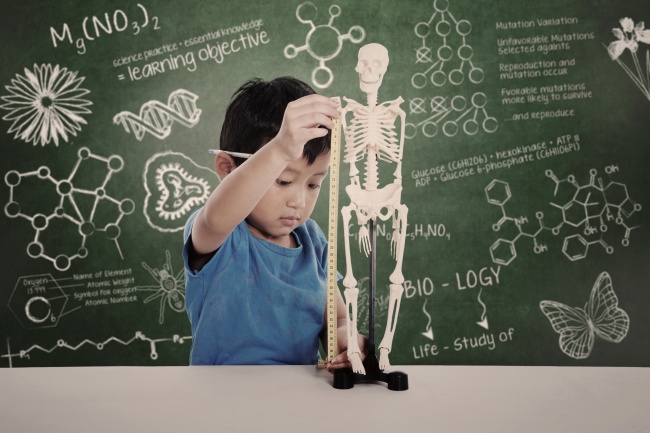Last month, 18-year-old Song Yoo-geun retracted his first academic paper “Axisymmetric, Nonstationary Black Hole Magnetospheres: Revisited” — which would have made him the youngest-ever Korean Ph.D. — after he was accused of plagiarism.
The shattered legend of a science prodigy once dubbed “boy genius” by media — and showered with government support from 2010 — sent shockwaves across the country and stoked questions over whether Korea was headed in the right path in educating its “gifted” children.
Education in Korea generally starts at a young age. Last year’s data by civil group World Without Worries About Private Education showed that parents spent 3.2 trillion won in a year on private education for their preschool children.
When children excel at their given task, many parents send them off to schools for the gifted in the hope that they may be the next child prodigy.
 |
| (123rf) |
“In addition to academic ability, we look at each children’s ability to motivate themselves, curiosity and creativity,” said Hong Kyeong-hee, an official from Seoul Metropolitan Office of Education who supervises these education centers.
“In order to do so, we’ve implemented a system where the homeroom teacher recommends students to be accepted to education centers based on a year of observation, in addition to the existing interviews and tests.”
According to the Education Ministry, there are currently some 2,524 classes for the gifted in schools across the country, and seven high schools which are built for the education of the gifted. In addition, education offices operate the education center for the gifted.
But there has been criticism that the so-called “gifted” schools had deviated from their initial purpose of fostering talented students in their respective areas.
Rep. Yoo Ki-hong of the main opposition The Minjoo Party of Korea analyzed the data from four science schools for the gifted, and found that 8.7 percent of their graduates went to study medicine in college.
In addition, almost all of the schools for the gifted are based on students’ academic abilities, stoking complaints that they have turned into cookie-cutter elite schools, sitting atop the school pecking order.
”The government enacted the law to foster child prodigies excelling in various fields, yet many of its students fall in line in a race to be accepted to prestigious colleges,“ said Kim Jeong-yeon, a researcher for the World Without Worries About Private Education.
Kim’s group recently divulged that 66.4 percent of the math questions in the entrance exams for gifted high schools were not part of the middle school curriculum, accusing them of prompting students to receive private education in order to be accepted.
What’s worse, Kim pointed out, is that contrary to their founding purposes, the gifted schools fail to provide education programs that allow students to foster creativity.
“In order to conduct a creative education, (the authorities) need to develop content and curriculum for them. But right now, teachers are largely responsible for creating programs. There is no actual guideline that they can abide by. Expanding just in quantity is not the priority,” she said.
Park In-ho, formerly head of the Korea Society for the Gifted, wrote in his paper, “The System and Policy for the Education of the Gifted in Korea” that gifted education was initiated in the 1970s as a reaction to side effects deriving from the standardization of education that saw abolishment of elite secondary schools.
“The driving idea behind the policy was to provide students with special abilities and talents an education that was compatible with such abilities, thus providing an equal learning opportunity,” he wrote.
The idea took off when the comprehensive education plan for the gifted was devised 1982, which was succeeded by the research lab on gifted education at the state-run Korea Education Development Institute in 1987.
In 2000, the country enacted the Act for Promoting Education for the Gifted. According to the bill, the term “gifted” refers to those with an outstanding talent that requires a specialized education to develop their full potential. Last year, the Education Ministry revised the law so that elementary and middle schools for the gifted could open.
Since then, the government has worked to include as many students as it can in the education program.
Roughly 1.8 percent of Korean students are currently receiving education for the gifted, according to the Education Ministry. Last year, the ministry said they aim to expand the percentage of students participating in the gifted programs to 3 percent.
The government includes the number of classes for gifted students in its evaluation of 17 education offices, mandating them to match its quota.
Experts, however, say that the education program for the gifted should shift its focus from quantity to quality.
Lee Won-key, the vice chief of Seoul National University of Education and an expert in English education, said that the main issue hindering the education for the gifted is that the teachers did not have a full grasp on how to teach child prodigies.
“Basically in Korea, child prodigies are placed under expectations to have certain level of knowledge. So the teachers give them complicated problems to solve instead of encouraging their inner drive to be curious and learn new things,” said Lee, who has helped advise on education policies in previous administrations.
He said that the authorities must change their framework of education for the gifted.
“The gifted children have the capacity to think outside the box, but existing programs for the gifted are based on lectures and question-solving. The gifted education must go back to the ‘basics,’ guiding students to look at things from a new perspective and encourage them to think rather than to instruct,” he said.
By Yoon Min-sik (minsikyoon@heraldcorp.com)

